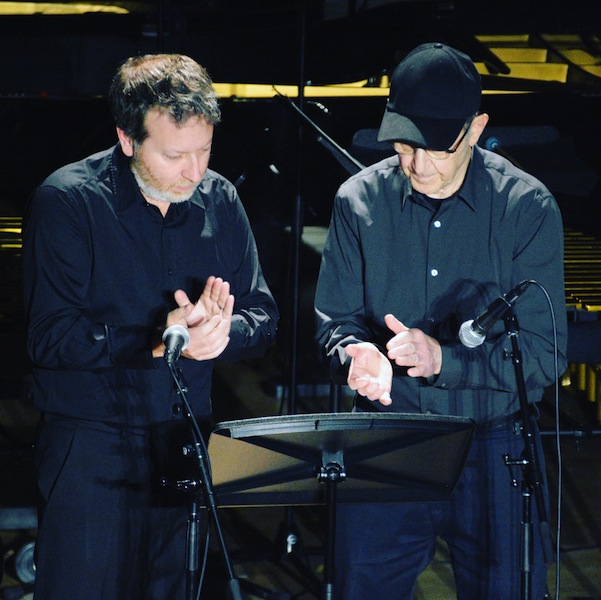Ensemble Signal celebrates Steve Reich at Library of Congress

Steve Reich and Brad Lubman perform Reich’s “Clapping Music” Wednesday night at the Library of Congress. Photo: Regan Music Service
Steve Reich turned 81 this month, and he continues to create music that stretches the ears. Ensemble Signal, which has made Reich’s music a specialty since its founding in 2008, presented an evening of the pioneering American composer’s recent works on Wednesday night.
Washington Performing Arts co-presented this unusual concert as the opening event of the season of free concerts at the Library of Congress. In a first for its concert series, the Library of Congress livestreamed the event on the Internet.
Reich, in his trademark baseball cap, took the stage with Ensemble Signal’s music director, Brad Lubman, for the only early work of the evening, Clapping Music. In this classic piece, from 1972, at least two pairs of hands clap the same syncopated rhythm. They start out in sync and then shift off from each other by a half beat over and over, with each phase disruption heard in eight repetitions, until they are unified once again.
Although they were amplified, Lubman and Reich clapped at different volumes, so that the interplay of the two parts was sometimes hard to hear. Even so, as the two parts intersected, Reich emphasized beats in his part that came out in the rests of the other, in a way that illumined the temporal patterns. The periodic structure of the piece, not to mention the meditative aura it creates, most recalls the repetitive form of the chaconne or passacaglia.
The best of the new works, all from the last ten years, was Quartet, from 2013, written for two vibraphones and two pianos–the signature instruments in Reich’s music. In a composer’s note Reich acknowledges that the piece is more complex than much of his recent music, observing that “it frequently changes key and often breaks off continuity to pause or take up new material.”
The instrumentation and the bouncy rhythms gave the first movement the air of Vince Guaraldi or Dave Brubeck. The vibes take the melodic lead, dancing over the multimetric shifts. Reich also moves into new harmonic territory in the mesmerizing second movement, which had a Debussyian dreaminess to it, a reminder of the similar influences of Asian music on both composers. A more manic fast movement, with rougher edges of rhythmic drive, made a delightful conclusion to this excellent piece.
Reich may want to build on the new sounds of Quartet as he moves forward, because the other recent pieces sounded like the work of a composer stuck in a rut. The concert concluded with Double Sextet, the piece that finally won Reich the Pulitzer Prize for Music in 2009. Ensemble Signal performed it with both sextets of instruments live.
Hopes that it would sound less mechanical this way did not come to pass. Part of the problem is the harshness of the amplified strings and winds, on obsessively repeated snippets or sustained, piercing dyads. In all of the pieces the playing was virtuosic and skillfully guided by Lubman at the podium. The antiphonal effects of the piece, clearest in the slow middle movement, are too close in time to make much of an impact, and the finale was more assaultive on the ears than anything else.
The other two pieces made much the same impression. The newest work, Runner, received its first local performance, part of a commissioning project combining Washington Performing Arts, the Library of Congress, and several other sponsors. It features a larger ensemble, almost a mirror arrangement like Double Sextet, with a string quartet, woodwind trio, vibraphone, and piano on each side. A single double bass player had only a few notes to play, reinforcing the bass line here and there.
Reich does not make much use of the possibilities of any of the instruments, writing for predominating long notes. Throughout there is a disappointing sameness, in rhythmic patterns, in dynamic level, in texture, in sound. A rock music-like driving beat adds a predictable burst of excitement, with rising lines that are gradually unified, ending in a pop fadeout. This Reich cliché ended this work and the rather similar Pulse, from 2015.
Hints of a possible new sound, more like the more pleasing Quartet, came only in the opening and ending of Pulse, echoing the gentle sounds of Copland’s Appalachian Spring. Here the repeated notes jamming in the electric bass made the kinship with rock music more evident, a visceral pounding quality that brought the audience to its feet here and elsewhere.
The enthusiastic response to Double Sextet earned an encore, the last movement of Reich’s Radio Rewrite, based loosely on music by the British rock band Radiohead. Here the syncopation of the bass line, part Prokofiev and part samba, relieved some of the previous monotony.
The program will be repeated 7:30 p.m. November 2 at Carnegie Hall in New York City. carnegiehall.org
